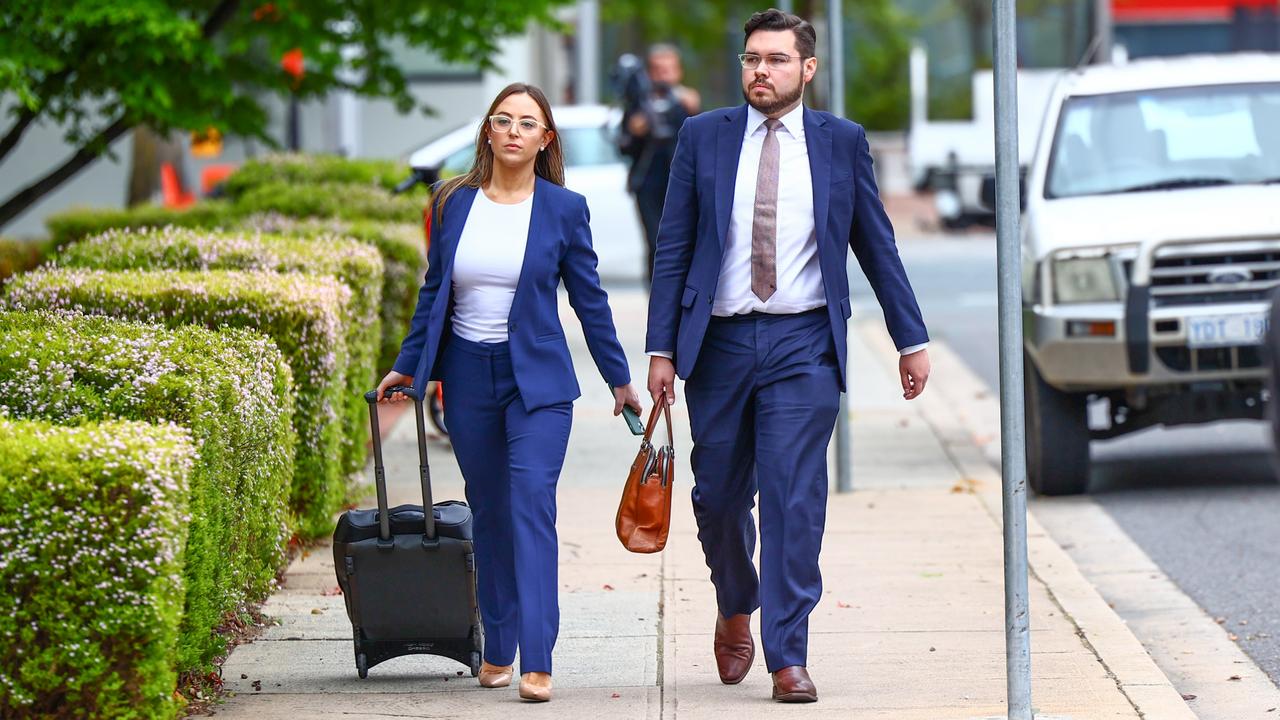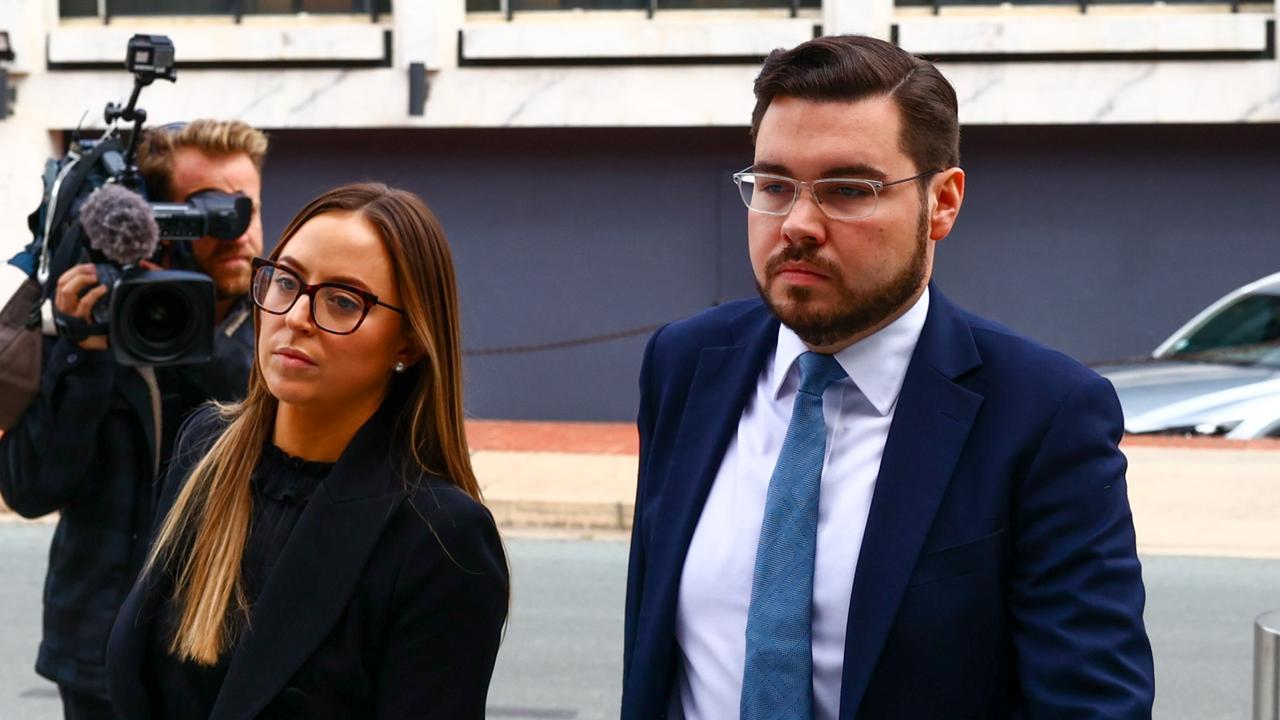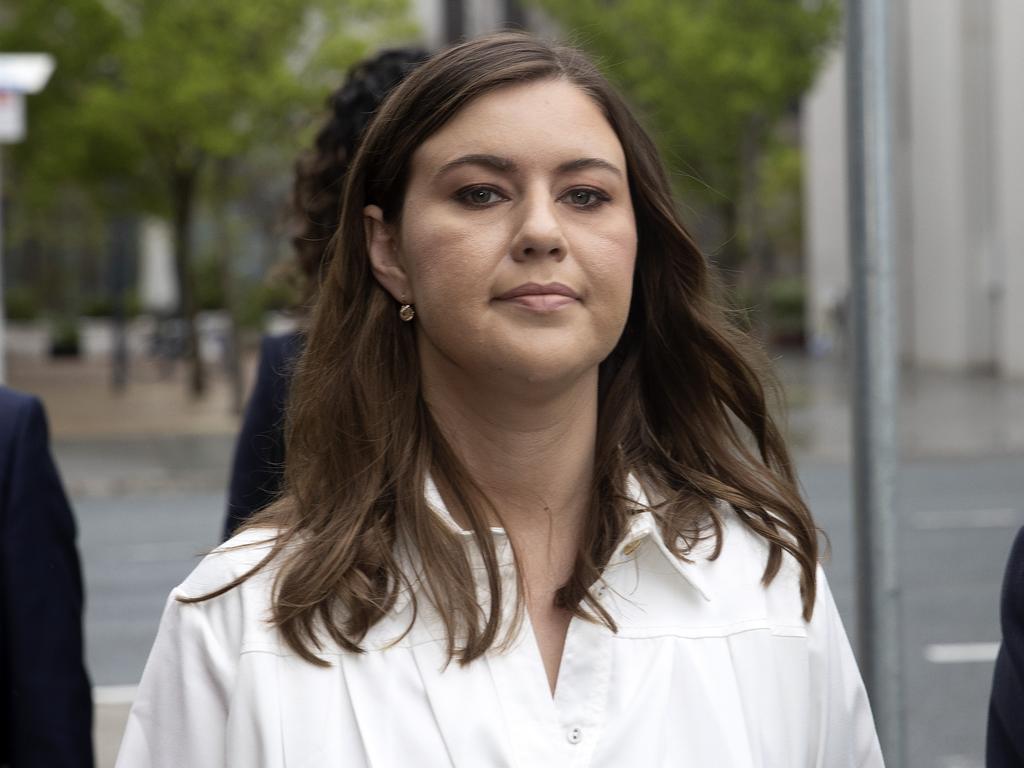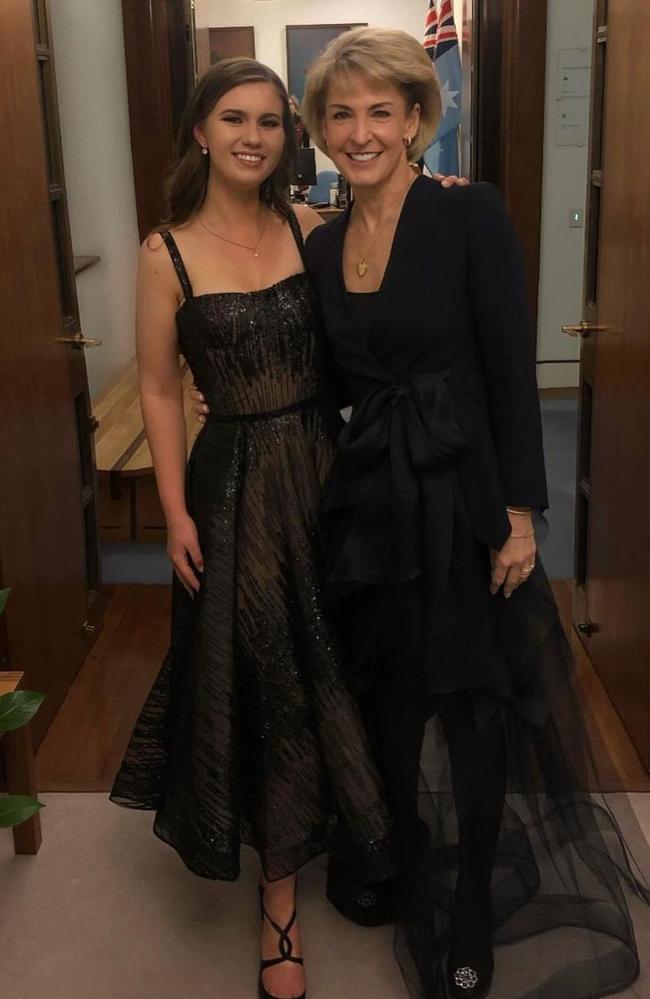Bruce Lehrmann trial: Final days for Brittany Higgins parliamentary rape trial, prosecution closes case
The prosecutor in the Bruce Lehrmann trial has told a jury that if Brittany Higgins has fabricated a claim of rape she is “quite the actor”.
The trial for the man accused of raping Brittany Higgins in Parliament House is nearing completion with the defence making its closing arguments.
Bruce Lehrmann is accused of sexually assaulting the former Liberal staffer in Senator Linda Reynolds’ office in the early hours of March 23, 2019.
He has pleaded not guilty to one charge of sexual intercourse without consent.
Brittany ‘quite the actor’ if claim is fake
Director of Public Prosecutions Shane Drumgold has told the jury that if Brittany Higgins has fabricated a claim of rape she is “quite the actor.”
The prosecution closed his case today telling the jury that “your first job, when you get into the jury room, is to wade through all that debris to find the essence of case.”
Mr Drumgold said the essence of the case is they needed to decide whether or not Ms Higgins had fabricated the rape claim and that questions of media interviews and book deals were “red herrings.”
The prosecutor said that Ms Higgins was a “witness of truth” who had told a consistent story and the evidence suggesting that was not a lie.
“If she did, it was elaborate,’’ he said.
Mr Drumgold said Ms Higgins told everyone from close personal friends, to work colleagues, to police and even her own mother thought she was a changed person.
“She’s taken an oath,’’ he said.
“We submit she did not falter. If this is a fabrication she’s also quite the actor.”
Mr Drumgold said if the jury did not believe she had fabricated the story then, “You must return a verdict of guilty. We say you should not accept the reasons of the accused for the reasons I’ve outlined.”
“If you agree, the only verdict you can return is a verdict of guilty.”
‘There was no sex’, jury told
The jury has been told “there was no sex” that occurred between Ms Higgins and Mr Lehrmann.
Defence barrister Steven Whybrow pointed out to the jury that he didn’t question Ms Higgins on her evidence on the mechanics of how the alleged assault occurred because “our contention is it didn’t”.
“There was no sex. It didn’t happen,” he said.
He told the jury they have the ability to consider whether what Ms Higgins described happened could have occurred the way she said in her evidence.
The “kindest way” to Ms Higgins that this case can be summed up is that she doesn’t know what happened on the night of the alleged assault, Mr Whybrow has told the court.
He said this was disregarding suggestions of deceit, dishonesty, secondary gain and personal interest.
“And just say, she doesn’t know. She doesn’t know what happened,” he said.
“You can’t be satisfied beyond reasonable doubt that she knows what happened.
Lehrmann wasn’t ‘showing any interest’ in Higgins, jury told
The court has heard that Mr Lehrmann was showing no interest in Ms Higgins while they were drinking at The Dock on the night of the alleged assault.
“You don’t see any body language indicating Mr Lerhmann is showing any interest in Ms Higgins,” Mr Whybrow said, adding that the accused even sat at a different table to the complainant.
He told the jury that if the CCTV from that night indicated he was “showing any flirtatious intent towards Ms Higgins” that it would have been included in the compilation played before the court.
Mr Whybrow also drew the jury’s attention to Mr Lehrmann telling Fiona Brown that he had gone back to Parliament House to drink whiskey but telling the police he went back to work on question time folders.
The defence said if Mr Lehrmann used the whiskey claim as a way to “cover his tracks”, it would be about one of the “stupidest things you could say”.
He suggested that the accused instead told Ms Brown that because of the previous security incident involving him and incorrectly handling a classified document.
The court heard this is why Mr Lehrmann chose not to tell her he had gone back to do some work.

Mr Whybrow said that Ms Higgins told multiple people, including Fiona Brown, Ben Dillaway and the police, that she had either gone or was planning to go to the doctors following the alleged assault, despite not seeing a GP during that time.
“That is something Ms Higgins told the police to make it sound more believable that she had been sexually assaulted,” Mr Whybrow said.
The defence said this is also why she told similar things to Ms Brown and Mr Dillaway.
He asked the jury to use their life experience, suggesting it was a “big deal not to go and see a doctor” if you believed you had been sexually assaulted.
Mr Whybrow recalled suggesting to Ms Higgins that she didn’t go because she didn’t need to because “it hadn’t happened”.
Mr Whybrow has suggested Ms Higgins was “prepared to say anything” when airing her allegations against his client.
He told the court that maybe Ms Higgins thought she could “say it and get away with it”, referring to her claims of sexual assault.
The court heard this is the problem when the “person bringing the allegation is prepared to just say anything”.
He then referred to Ms Higgins claiming she was having a panic attack “for three hours” one day following the alleged assault, which he told the court was not what had happened.
The jury was pointed to a conversation she had with Lisa Wilkinson, in which she was asked whether Mr Lehrmann had “removed her panties” and she said yes.
When asked about this while giving evidence, Ms Higgins indicated she was incorrect and pointed out she did not sign that transcript confirming what was said was true and correct.
The court had previously heard Ms Higgins say she did not wear underwear with that dress due to the lines it caused.
“She was prepared to say something to Lisa Wilkinson that was totally, and she must have known, in my submission, was not true,” Mr Whybrow said.
‘Not good for your CV’
Mr Whybrow has suggested that it wouldn’t be good for Ms Higgins’ resume if it got out that she had passed out in Senator Reynolds’ office.
He told the jury it would be “pretty embarrassing” if people heard that Ms Higgins had been out and gotten “hammered”, came back to Parliament House and was found in the minister’s suite the next morning.
“Not good for your CV,” he told the jury.
I might wait to a more sensible hour, grab a jacket, and walk out at 10am”
Mr Whybrow pointed to the agreed fact that Ms Higgins had responded to a text from her ex-boyfriend Ben Dillaway at 8.17am on March 23, 2019, saying it showed she was awake before a security guard knocked on the door at around 9.15am.
He said she “waited nearly two hours” before she departed Parliament House, suggesting her thought process may have been to wait until a “more sensible hour” and “hope nobody noticed”.
‘Totally untenable’: Defence makes closing submissions
Defence barrister Steve Whybrow is making closing submissions in the trial of Bruce Lehrmann arguing the onus of proof is on the prosecution to prove their case.
“The case is not about whether she made this up,’’ he said.
“Mr Lehrmann has no onus to prove anything. We already know there’s already been a fair bit of trial by media
“We are here to consider the evidence in this courtroom.”
Mr Whybrow suggested the Director of Public Prosecutions did not accurately or completely outline the evidence in his own submissions.
“You might recall he said there was not skerrick of evidence her job was remotely at risk.
“There are so many pieces of evidence,’’ he said.
Mr Whybrow said that when the evidence was considered that position was “totally untenable.”
Higgins was driven by a fear of losing her “dream job”, court hears
Mr Whybrow has told the jury that Ms Higgins’ fear of losing her “dream job” – which he explained was to continue working in Parliament House – was an “explanation for what she did”.
“And it all fits in,” he said.
He told the court that Mr Drumgold didn’t “accurately or completely summarise the evidence” of the case.
“You may have thought we were in a different case at some point,” he said.
Mr Whybrow pointed to parts of the prosecution’s closing argument that suggested Ms Higgins’ job was not at risk after she raised her allegations with her employer.
Mr Whybrow said there were “so many pieces of evidence” that suggest Ms Higgins was concerned about her job.
‘There was no sex’: Lehrmann’s lawyer hits back
The jury has been told “there was no sex” that occurred between Ms Higgins and Mr Lehrmann.
Mr Whybrow pointed out to the jury that he didn’t question Ms Higgins on her evidence on the mechanics of how the alleged assault occurred because “our contention is it didn’t”.
“There was no sex. It didn’t happen,” he said.
He told the jury they have the ability to consider whether what Ms Higgins described happened could have occurred the way she said it had in her evidence.
The “kindest way” to Ms Higgins that this case can be summed up is that she doesn’t know what happened on the night of the alleged assault, Mr Whybrow told the court.
He said this was disregarding suggestions of deceit, dishonesty, secondary gain and personal interest.
“And just say, she doesn’t know. She doesn’t know what happened,” he said.
“You can’t be satisfied beyond reasonable doubt that she knows what happened.”
Mr Lehrmann missed six calls from then-girlfriend on night of alleged assault
On Tuesday, the prosecution tendered an agreed statement of facts, which was read out to the ACT Supreme Court by Chief Justice Lucy McCallum.
As part of one of the 11 agreed facts, the jury heard Mr Lehrmann’s girlfriend at the time of the alleged assault attempted to call him multiple times in the early hours of March 23, 2019.
The court heard the accused missed six telephone calls from his then-girlfriend between the hours of 2.16 and 2.18am.
Some of the other agreed upon facts include that there was no evidence that Mr Lehrmann or Ms Higgins accessed the Parliament House computing network between 1.30am and 2.40am on March 23, 2019.
Another of the tendered fact states that Ms Higgins called her ex-boyfriend and former colleague Ben Dillaway at 10.39pm on March 22, 2019, but her call was not answered.
Mr Dillaway then sent a text to Ms Higgins at 8.09am the following morning and she sent one back at 8.17am.
Director of Public Prosecutions Shane Drumgold has begun his closing arguments, warning the jury not to get distracted by “side issues” while making their decision.

Higgins ‘completely unconscious when sex started’
When referring to whether Ms Higgins would have been able to consent to sexual intercourse while in Parliament House, Mr Drumgold said it was “clear she was highly intoxicated” and “consequently incoherent”.
The jury heard Ms Higgins was “completely unconscious at the time when the sex started”.
Mr Drumgold pointed to evidence given by Ms Higgins where she said she didn’t think she had ever consumed that much alcohol in her life.
He said it pointed to her credibility as a witness that she told the court she had skolled a drink before, maybe twice in her life prior to that night.
“She could say ‘Oh goodness I have never drunk that much and I have never skolled’,” Mr Drumgold told the court.
Higgins faced with ‘fork in the road’
Ms Higgins was faced with a “fork in the road” in the weeks following her alleged assault, the court has heard.
Mr Drumgold directed the jury to evidence from military aide de camp, Nikita Irvine, in which she told the court that she spoke with Ms Higgins on either the Wednesday or Thursday following the alleged assault.
Mr Drumgold said when she spoke to Ms Irvine, the former Liberal staffer was “already expressing concerns for the election” and the impact it could have if her allegations became public.
When Ms Irvine spoke to Ms Higgins again a few weeks later, she was informed that she would not be going ahead with the police complaint.
“She said to Ms Irvine that she just had to accept her decision,” Mr Drumgold said.
“This is clear evidence, in our submission, that she was faced with a fork in the road.”
Mr Drumgold said this referred to either keeping her dream job working in Parliament House or moving down the other path and pressing ahead with a police complaint.
Higgins ‘right to be scared’
Britany Higgins was “right to be scared” about making a rape allegation as a young person in a world of powerful political forces, the Director of Public Prosections Shane Drumgold has told the Court.
In his closing address to the jury, Mr Drumgold said it was clear that powerful political forces were at play as evidenced by former Defence Minister Linda Reynolds decision to contact the defence lawyer Steve Whybrow seeking transcripts.
He raised Ms Higgins fear at discovering on February 24, 2021, that Peter Dutton had been briefed by the AFP about her complaint before the media reported it.
“We say she was right to be scared,’’ Mr Drumgold said.
“She was right to move slowly and carefully.”
Mr Drumgold said there were “strong political forces” at play.
“Suffice to say there were clearly strong political forces at play in the period immediately after the events, through the election and beyond,’’ he said.
“These forces were at play for the almost two years she worked for Senator Cash.”
After the morning break, Mr Drumgold added that he was not suggesting the defence was part of those forces.
“I said it’s clear there are strong political forces at play here,’’ he said.
“I am not suggesting for a moment that the defence counsel is part of those political forces.”
Instead, he said it went to some of the motivations of other witnesses.

Accused ‘attracted to’ Brittany, court told
The court had heard that Mr Lehrmann was attracted to Ms Higgins in the lead up to the night of the alleged assault.
Mr Drumgold said “we know the answer is yes” when putting it to the court whether the accused was attracted to Ms Higgins.
He pointed to evidence from Nicole Hamer in which she told the court Mr Lehrmann commented on Ms Higgins being “good looking” before she was hired by Senator Linda Reynolds.
He also pointed out that in her second police interview, Ms Higgins told authorities that Mr Lehrmann tried to kiss her following a work event at some time in March 2019, which she rejected.
The jury were also asked to consider why Mr Lehrmann entered Parliament House that evening.
Mr Drumgold suggested it was the “most convenient place to get the drunk and very vulnerable complainant alone”.
“With the hope she would either not resist or not remember,” the court heard.
‘Not about #metoo’: Prosecution’s warning to jury
Mr Drumgold has warned the jury not to get “distracted by side issues or red herrings”.
In his closing argument, Mr Drumgold ran the jury through what the case against Mr Lehrmann was not about.
He said it was not about political parties, workplace cultures or whether Parliament House responded to reports of a security breach appropriately.
“It is certainly not about the experiences of other women in Parliament. And it’s not about the metoo movement,” he said.
“This case is about what happened on a couch in a room on Saturday the 23rd of March 2019.”
The jury has heard it “defies common sense” that anything Ms Higgins said or did two years after the alleged assault in 2020 could “impact the credibility of what she said or did back in 2019”.
Mr Drumgold then called out claims made by the defence throughout the trial, including telling the jury that Ms Higgins signed her own name on entry to Parliament House.
The prosecution said this “clearly did not occur”.
He also hit out at the defence telling the court it was “unusual” for police to do two recorded interviews with a complainant.
“This was clearly advanced as being something you should use to reduce credibility,” Mr Drumgold said.
“As a question of law the mere fact police did a second interview can no way impact the credibility of the first interview.”

Senators grilled on witness stand
On Monday, the jury heard from Ms Higgins’ former employers, Senator Reynolds and Michaelia Cash.
Senator Reynolds was questioned over a text message she had sent to Mr Lehrmann’s lawyer as Ms Higgins’ cross examination was underway, asking for transcripts of the former staffer’s evidence to be sent to her lawyer.
She told the court she did not know doing so was inappropriate, as she was later advised.
During Senator Cash’s evidence, she told the court she did not know about Ms Higgins’ assault allegation until February 5, 2021. The former staffer testified she had spoken with her about the night in question on multiple occasions.
More Coverage
When asked by the prosecution if Ms Higgins’ allegations being made public at the time could be “politically harmful”, the senator said “absolutely not”, telling the court she did not “understand the political connection to this”.
The court also heard from Senator Cash’s chief of staff Daniel Try, Detective Senior Constable Sarah Harman, Qld Liberal MP Samuel O’Connor and the person tasked by the AFP to extract data from Ms Higgins’ phone, Peter Reid.
The trial continues today.





